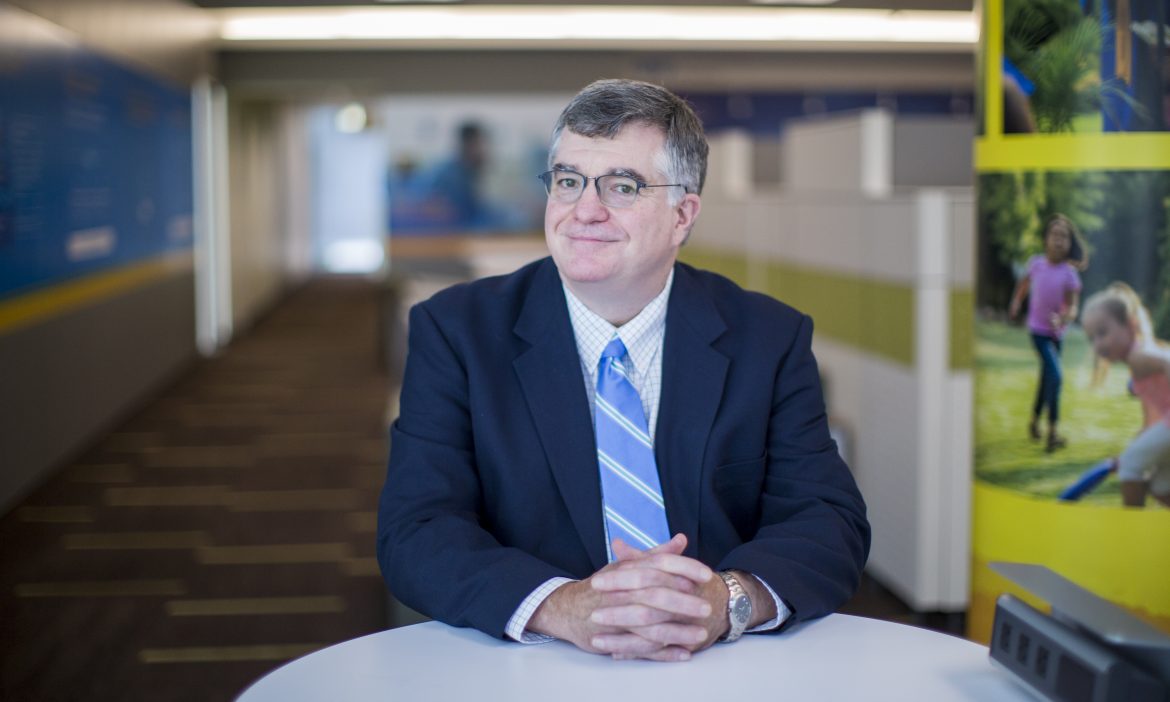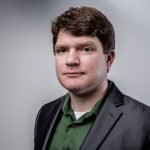A massive, detailed, topographical map of Tennessee hangs in the home office of Charlie Steinhice, business analytics manager at BlueCross. A gift from a colleague, the map is more than a mere decoration or conversation starter for virtual meetings.

Rather, it’s a reminder of the only place he’s called home, of a lifetime of experiences, and a sprawling representation that inspires his work on our members’ behalf.
“Part of our mission is to help provide more care options for our members closer to where they live,” Charlie says. “While working on a project last summer, we looked at communities in need of more medical professionals and options for clinical resources. But to truly serve those communities, to understand the regions and micro regions within them, you had to know the topography. You had to know the highways. You had to know how long it took you to get from this town to that, and where it made more sense to advocate for more resources.”
Charlie was uniquely qualified for this particular project. He had already absorbed a lot of that knowledge firsthand thanks to decades spent visiting all 95 Tennessee counties. Those journeys were part of his personal goal to visit every single county in the United States.
“I’m a little over 80% of the way there,” Charlie says. “At least once a year, I take a long weekend and go to the flat places that other people think are boring. When you’re on the road and in a new place, you’re looking for the local diner, the historical marker, the town museum, the place that has such a weird name that you just have to go find out why.”
A household of learning
“Finding out why” has been a constant throughout Charlie’s life. But to understand the origins of his sense of adventure, you have to start before the Chattanooga native was born.
 “My father was born in Baltimore, went out to sea when he was 12 or 13, and bummed around the world,” Charlie says. “He tagged along with an Army buddy returning to Tennessee to find a job. My mother was born in this area but spent her formative years moving around, most notably a six- or seven-year stint in the American sector of West Berlin immediately after World War II.”
“My father was born in Baltimore, went out to sea when he was 12 or 13, and bummed around the world,” Charlie says. “He tagged along with an Army buddy returning to Tennessee to find a job. My mother was born in this area but spent her formative years moving around, most notably a six- or seven-year stint in the American sector of West Berlin immediately after World War II.”
Charlie’s father, functionally illiterate until he was almost 30, had dropped out of school after third grade. After moving to Tennessee, a stomach cancer diagnosis and eventual recovery left him unable to perform physical labor. While in the hospital, he recommitted to his studies. Five years later when he met Charlie’s mother, he was a college graduate and a teaching assistant at Nashville’s Peabody College.
“I’ve told people that was the greatest break of my life, never mind the fact that I wasn’t born for almost another decade,” Charlie says. “It’s remarkable that they found each other, and they never would have met and I wouldn’t exist if he hadn’t decided to get that education.”
The youngest of four, Charlie grew up in a house he describes as “filled with books and music and learning and inquisitive questions.” He buried himself in books, and even spent a summer reading a set of children’s encyclopedias.
“My parents read because they enjoyed it,” Charlie adds. “If we did our chores, we could stay up late and read. Then, I got to school and found out other people thought that was a chore.”
Finding his own path — and veering from it

Despite his parents’ early treks around the globe, Charlie was in no hurry to leave Chattanooga behind, despite its 1970s reputation as a dying factory town. Though he spent a year at college in St. Louis on a full scholarship, he returned to Tennessee following his father’s passing from pancreatic cancer. The tragedy shook his close-knit family.
Charlie then took a three-year hiatus from higher education, working third shifts at a convenience store to save money. He returned to earn a history degree at the University of Tennessee at Chattanooga and later a masters in library science at the University of Tennessee.
“Librarians are taught not just to track down information, but to assess the source and determine the validity,” Charlie says. “You’re taught to ask questions that people didn’t think to ask you. History helps you put those things into context, to look at cause and effect.”
“History and library science may seem like odd degrees for someone who manages a team of biostatistical research scientists, but I use those skills on a daily basis.”
He immediately put those skills to use after joining BlueCross in 1996 for a surprising — though at the time, highly sought-after — position.
“Once upon a time, online searching was a job skill,” Charlie says with a laugh. “There were proprietary databases with valid business information that wasn’t available for free. It was expensive to search business filings, medical journals and things along those lines, and hiring someone trained to do that could save you a lot of money.”
Of course, within a few years that job became obsolete. Fortunately, Charlie made a lateral move to financial analysis of health care claims before joining the medical informatics team (now known as information delivery). This role gave him one foot in the financial and one foot in the clinical — not only crunching numbers, he says, but explaining them.
“I figured out that, in terms of analytics, what I needed to do was to give my internal clients what they needed and not just what they asked for,” he says. “When I got in the room with them and understood what they were trying to do, I was able to tailor the analysis to address the big underlying question. That’s one thing I learned at a library: Someone comes to the reference desk and asks a question, but it’s not necessarily what they really wanted to know. It’s the question they think will get them the information they think they need.”
 As business analytics manager, Charlie trains his team to ask the better questions themselves and to understand the needs of the populations and sub-populations we serve. These questions are constantly changing, as nature of health care delivery itself is evolving.
As business analytics manager, Charlie trains his team to ask the better questions themselves and to understand the needs of the populations and sub-populations we serve. These questions are constantly changing, as nature of health care delivery itself is evolving.
“We don’t know what the health care environment is going to look like five years from now, but we need to be prepared to understand as it evolves and identify the most workable solutions that do the most good.”
Sticking to the plan(s)
Though the pandemic may have necessitated a slowdown in his goal to visit every U.S. county, Charlie has found ways to seek out new experiences in his own state. His wife Linda, whom he met at BlueCross, is often along for the ride.
“A car with the windows rolled up is actually a pretty good form of social distancing,” Charlie says. “We take Sunday drives within a 50- to 75-mile radius of Chattanooga, exploring highways and back roads that either I’d never been on, or I hadn’t been on long enough to forget how pretty they were.”
Though it took a few years, Charlie’s two grown daughters have developed their own wanderlust, which, not surprisingly, their father actively encourages.

“I take great pride in giving them a new atlas every year, because I don’t care what a GPS does, you need maps,” Charlie says in true dad fashion. “GPS tells you how to accomplish what you’ve decided, but maps give you options.”
Atlases are just one area where Charlie gives back. Another is Mensa, the nationwide organization for people who score in the top 2% of certain intelligence tests. Earlier this summer, he was elected president of the board of trustees of the Mensa Foundation, the organization’s charitable arm.
“Simply put, we’re trying to help unleash intelligence for the betterment of humanity,” Charlie says. “We’re looking to see which of our programs are doing the most good, what changes we ought to make, and what else opens the door for bright minds to accomplish the next great thing.”
And, as has been constant in his life, threads come together — his work with the Mensa Foundation connects with another organization dear to him, the Pancreatic Cancer Action Network.
“My advocacy there involves asking, where are the next generation of researchers going to come from? Where are the scientists who are going to cure cancer coming from?” he says. “You’d be amazed how many of those bright people don’t realize how capable they are. They aren’t getting an outlet for it. We want to give them the opportunity to show what their minds can do and what they could accomplish.”
 Charlie himself has accomplished much in his 25 years at BlueCross. Thanks to his love of history and vast knowledge of the company, he played an active role in editing a book celebrating its 75th anniversary. Though he continues to travel many paths of his own, Charlie is most excited about what’s to come from the next generation of thinkers, learners, and doers.
Charlie himself has accomplished much in his 25 years at BlueCross. Thanks to his love of history and vast knowledge of the company, he played an active role in editing a book celebrating its 75th anniversary. Though he continues to travel many paths of his own, Charlie is most excited about what’s to come from the next generation of thinkers, learners, and doers.
“I’ve been very lucky in the opportunities that I’ve had, and it took me a while to find my traction and find out what I could do to make a difference,” he says.
“Whether it’s students, cancer survivors, our members, or all of the above, I want to help other people on that path as well.”


 Jesse joined the BlueCross BlueShield of Tennessee corporate communications team in 2017. A Chattanooga native, he has more than 15 years’ experience in content creation, management, and strategy for consumer audiences, including a six-year stint in health care marketing.
Jesse joined the BlueCross BlueShield of Tennessee corporate communications team in 2017. A Chattanooga native, he has more than 15 years’ experience in content creation, management, and strategy for consumer audiences, including a six-year stint in health care marketing.